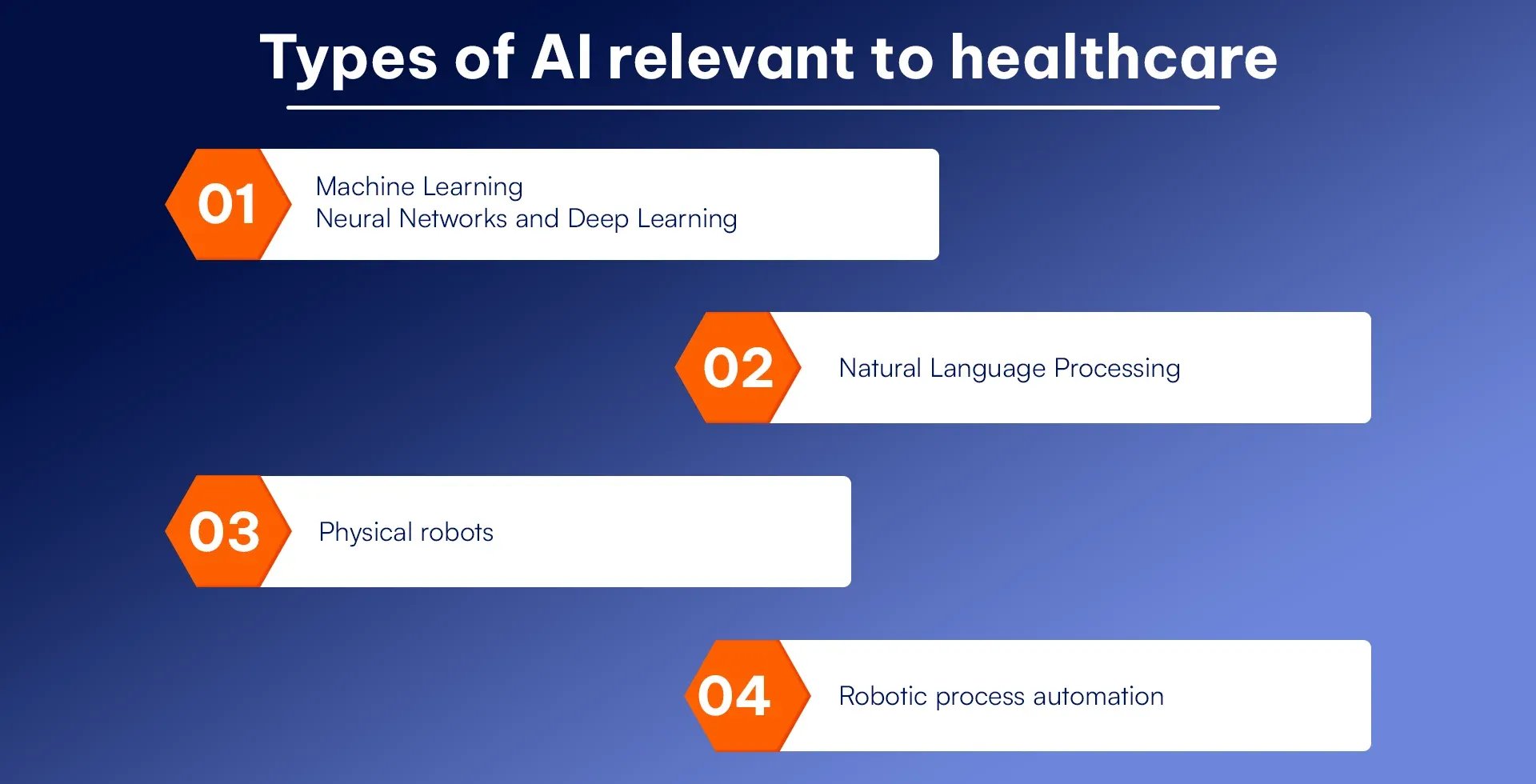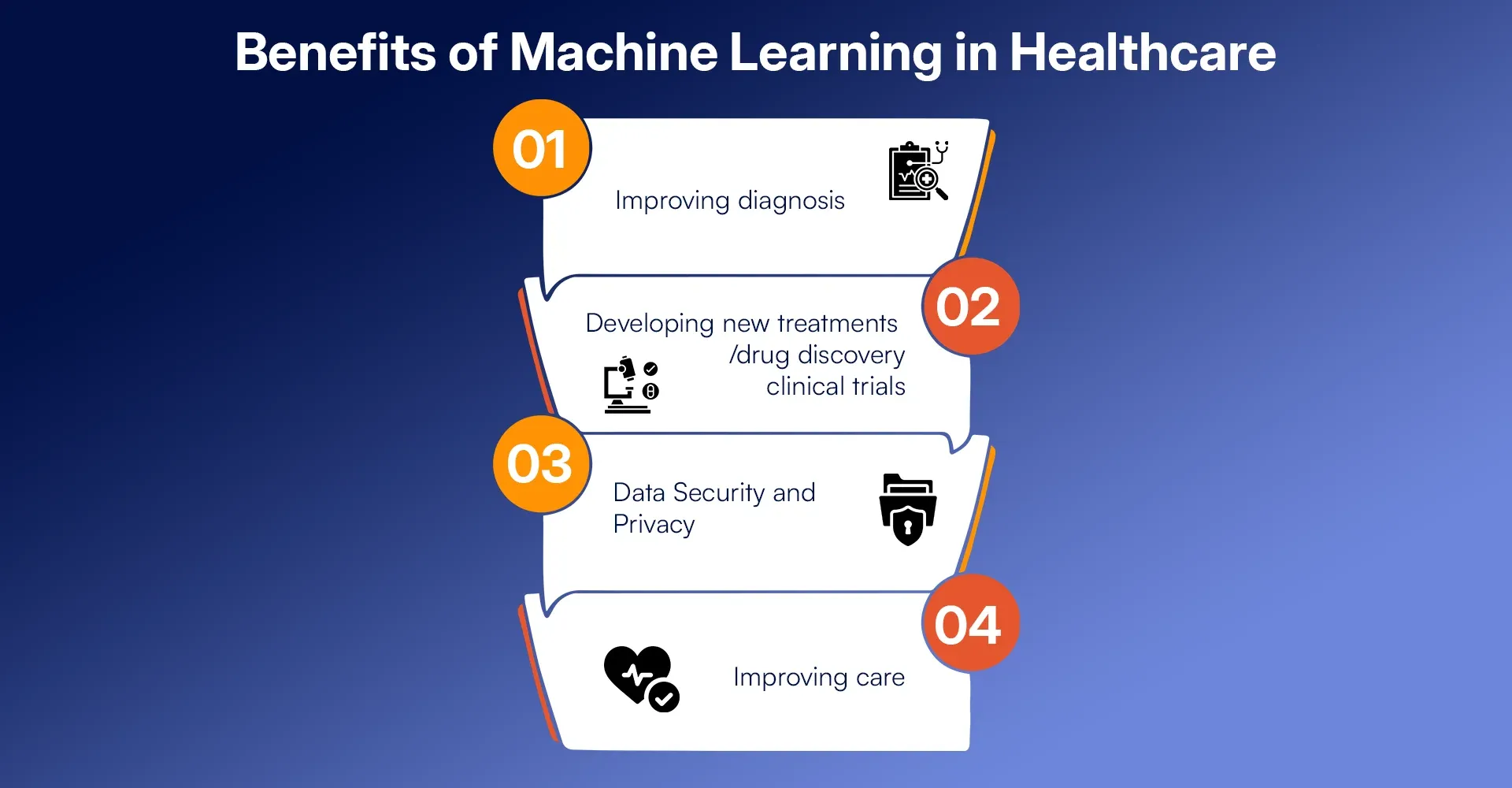
Healthcare is a demanding industry that needs rapid advancements to address its many challenges. It has been looking at artificial intelligence for solutions ever since applied AI started leading the wave of transformative change, shaping different industries. Machine learning could be the technology that brings about the profound impact needed to revolutionise healthcare. With the help of machine learning, it is possible to Improve diagnosis in terms of accuracy and cost. It can also assist in the development of new treatments and even enhance patient care. Owing to its learning and data processing abilities, innovations in healthcare can pick up pace by analysing the large data sets generated by healthcare institutions and identifying the patterns and insights that it has to offer. Other than simplifying diagnosis and treatment, the same method can also streamline administrative processes.
Healthcare is adopting machine learning to elevate patient outcomes and the quality of care. Let's dive into what machine learning is, why it matters, and what to expect from machine learning in healthcare.
What is Machine Learning?
Machine learning is a branch of artificial intelligence that learns algorithms by identifying patterns in large data sets, aiming to predict data without any explicit programming. This is done through the use of statistical methods. These algorithms can be used to automate the building of an analytical model and, in the end, enhance decision-making efficiency.
Why is Machine Learning Important for Healthcare Organizations?
Machine learning is a valuable resource in the interpretation of vast healthcare data, such as in the analysis of electronic health records (EHR). Through the analysis of medical records, machine learning can enable predictive precision medicine for improvements in the delivery of care to patients and increase patient outcomes.
It can help healthcare organisations make sense of large volumes of unstructured patient data from their records and help them make sense of it for data-backed decision-making in treatment, patient management, and patient care. In this way, it has the potential to convert complex medical text into analysable data.
The applications are not limited to prediction, but they can also streamline patient-based processes with the combination of ML algorithms with other AI technologies, such as natural language processing (NLP).
Will Machine Learning Replace Doctors?
There’s a growing interest among medical and healthcare organisations regarding artificial intelligence. Not counting the substantial impact generative AI has had on clinical applications, there has been an exponential growth in healthcare use cases for machine learning with an attempt to improve diagnostic accuracy and personalise treatments.
In this regard, machine learning is admittedly better. It can analyse data beyond human capability, revolutionising diagnoses and treatment options. However, it can only enhance efficiency, accuracy, and personalisation in healthcare.
In practice, machine learning can have an assistive role, allowing doctors to focus on patient care, clinical judgement, and patient interactions. These are some of the many medical practice nuances that are beyond the scope of machine learning. Thus, it is highly unlikely that machine learning alone will be able to replace doctors and should instead be seen as a helping hand that improves healthcare rather than disrupting it. The end result is likely to be an amalgamation of machine learning and medical expertise.
Also read this article : What is generative AI? How does it work?
Types of AI relevant to healthcare
To get a bird’s eye view of where machine learning is placed in the overall domain of artificial intelligence and how the various aspects and branches of AI research come together in their applications, let us get a look at the types of AI that are relevant to the healthcare industry.

-
Deep Learning: Advanced neural networks learn from vast data, speeding diagnosis.
-
Natural Language Processing (NLP): AI that processes and generates human language that can study and analyse clinical records.
-
Physical Robots: These are machines which operate autonomously and do non-physical tasks, like, for example, a physical robot that would be programmed to carry out non-invasive surgery procedures with the aim of getting better results owing to precision in movement.
-
Robotic Process Automation (RPA): RPA allows using AI to complete critical but repetitive tasks like handling data entry.
Benefits of Machine Learning in Healthcare
Machine learning in healthcare can significantly improve diagnosis and treatment while enhancing cost efficiency, patient tracking, and data security. This can speed up drug discovery and improve clinical output by reducing the cost and chances of error in manual processes, proactively monitoring patient health and securing patient data. Let us further analyse the many benefits of machine learning in healthcare.

1. Improving diagnosis
ML-enabled diagnostic tools can analyse medical reports and images, such as X-rays and MRI scans, and recognize patterns in imaging to predict diseases based on historical data, which leads to quicker and more accurate diagnoses and improvements in patient outcomes.
2. Developing new treatments
Machine learning can be used to develop new treatments, including multiple use cases in drug discovery and clinical trials. At the same time, it can speed up the discovery of various illnesses. The added advantage of using machine learning for these purposes is the identification of unknown side effects and enhancements in the safety and effectiveness of procedures.
3. Data Security and Privacy
Machine learning leads to more stringent security of sensitive patient data by detecting cybersecurity threats in real time and taking appropriate action. This is done through the identification of unusual patterns to prevent breaches.
4. Improving care
Machine learning can lead to a drastic improvement in the quality of patient care. Through the proactive monitoring of the patients through deep learning algorithms, AI can send alerts to medical devices and ensure timely care while autonomously updating electronic health records.
Will Machine Learning Replace Doctors?
A subject exciting and concerning many is the question of whether machine learning will replace doctors. Even as the boundaries of technology continue to expand, especially in health care, machine learning is transforming the field. But, thereby hangs a question: Does this transformation portend the replacement of human doctors or redefine their role to take maximal advantage of humans and machines combined?
The Rise of Machine Learning in Healthcare
Machine learning has emerged as the new management and interpretation tool for large volumes of medical data. Over the past ten years, growth in computing power, development in algorithms, and availability of data have contributed to accelerating the rate of progress in medical applications. All of these-improving the accuracy of diagnostics, and tailoring treatment plans for individual patients-all fall within the scope of ML.
These ML models are able to pick up on patterns and predict something that, under normal conditions, would have been impossible or even too complicated for human assessment. For example, deep learning algorithms can recognize the most minuscule abnormalities in imaging scans, which a most experienced radiologist may even fail to spot. This has spawned several health-related applications such as:
- Diagnostic Imaging: They can correctly detect conditions such as breast cancer, lung nodules, or diabetic retinopathy with high precision.
- Predictive Analytics: Given the data from electronic health records and lifestyle activities, patient outcomes can be predicted. Optimized Treatments: The basis for providing individualized treatment recommendations through analyses of genetic, clinical, and environmental factors might be used.
Machine Learning as a Tool, Not a Replacement
The capabilities of machine learning are incredible. Yet, it is no replacement for the human doctor. Instead, these are powerful tools that increase the efficiency and accuracy of medical care. Here's why:
-
Augmenting Diagnostic Accuracy: ML can analyze data faster and more precisely than humanly possible, but doctors provide the critical layer of clinical judgment needed to interpret these results in context.
-
Streamlining Administrative Tasks: Algorithms can handle data-heavy processes like billing, coding, or managing patient records, freeing doctors to focus more on patient care.
-
Supporting Decision-Making: ML algorithms provide suggestions but the final judgment must be rendered with patient-specific subtleties, which a doctor alone is best positioned to make.
-
Emotional and Contextual Care: Beyond data and algorithms, clinical practice requires empathetic communication with an understanding of individual patient histories—something a human can alone provide.
Difficulties and Ethical Questions
While the benefits of integrating machine learning into healthcare can be compelling, challenges persist. Algorithms are as good as and only as useful as the information they are provided with to operate on. An inequitable outcome can lead to biased input data. Algorithms must be treated with transparency with regard to how the algorithms work themselves, and measures need to ensure privacy concerns through regulation to bring these technologies forth.
The Future: Collaboration Rather Than Replacement
Ultimately, it's not about replacing doctors but rather augmenting their abilities. Routine tasks will be automated, and data-driven insights will free doctors to focus on areas where their expertise is indispensable. This collaboration promises a healthcare system that is more efficient and accurate but also patient-centric.
The future of healthcare is collaboration: doctors and ML together for better outcomes. If anything, machine learning hands doctors greater power to deliver care that is at once technologically sophisticated and reassuringly human.
Conclusion
The scope for machine learning in healthcare is quickly materialising with the increasing integration of machine learning models in treatments, trials, and research applications. However, for its true future potential to materialise, we need continued advancements in AI technology in order to achieve greater efficiency and accuracy in healthcare processes.
Machine learning operates in synergy with healthcare professionals and can be a valuable tool for enhancing much of their workload instead of the misplaced idea of replacing them. The combined expertise is poised to revolutionise healthcare, improving patient outcomes and efficiency across the industry.
Need help implementing machine learning and artificial intelligence use cases in your healthcare institution? Talk to our experts at Rejoice Hub to machine-learning healthcare opportunities.
Frequently Asked Questions
1. What is machine learning, and how does it work in healthcare?
Machine learning is a kind of artificial intelligence that uses algorithms to find patterns or relationships in large datasets which allows predictions and decisions even without explicit programming. In healthcare, it helps in analyzing data related to medicine, develops better diagnoses, improves patient care, and supports drug discovery.
2. How does machine learning advance diagnostic accuracy?
Machine learning tools will analyze medical images, reports, and historical data for patterns that will predict the disease more accurately and much faster than other methods, ultimately leading to better patient outcomes.
3. Can machine learning come up with new treatments?
Yes, machine learning accelerates drug discovery, clinical trials, and treatment innovations. It can identify unknown side effects and improve the safety and efficacy of medical procedures and medications.
4. In what ways does machine learning improve patient care?
It improves patient care by predicting health conditions and alerting patients in advance for immediate medical intervention, updating the electronic health records automatically in order to ease the process.